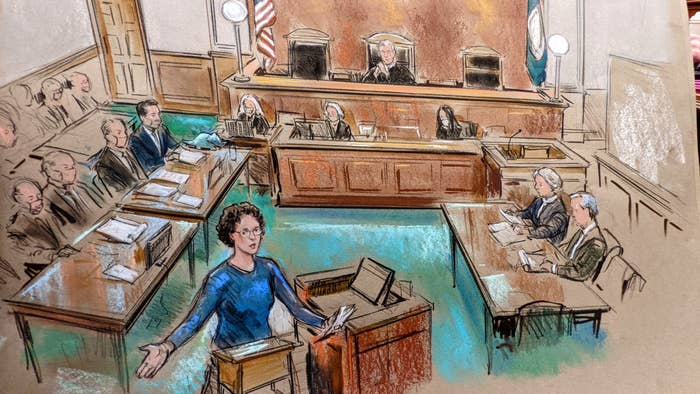
CHARLOTTESVILLE, Virginia — A jury found a group of the most notorious white supremacist leaders and organizations in the United States violated state civil rights laws by conspiring to commit racially motivated violence at the 2017 “Unite the Right” rally — and ordered them to pay more than $25 million in damages to their victims.
The 11 jurors came to the decision on Tuesday after a four-week civil trial that was punctuated with emotional victim testimony, descriptions of horrific violence, and bizarre outbursts that sometimes sounded more like Nazi propaganda than courtroom dialogue.
The rally left dozens wounded and one anti-racism activist dead.
The jury was not able to reach a unanimous decision on federal conspiracy charges, however.
Roberta Kaplan, co–lead counsel for the plaintiffs, said after the verdict was read that her team plans to refile the federal claims against the defendants. She said she believes the jury was eager to get home before the Thanksgiving holiday and that a new jury would rule in her clients' favor in the federal conspiracy charges.
“We think the facts were established. We think that the finding of liability in count 3 showed a conspiracy,” she told reporters outside the courthouse. Kaplan let out a shout of “Yes!” as she stepped into her black SUV.
The verdict in the landmark trial comes amid a resurgence of far-right domestic violent extremism and the mainstreaming of these ideologies, ushered in by Donald Trump. The former president’s hyperpolarizing populism, nationalism, and racist rhetoric has enabled his followers — and some elected Republicans — to endorse violence, including an attack on the US Capitol in January. For years, the legal system has struggled to hold these far-right extremists accountable for their actions. President Joe Biden, who said it was the racial violence in Charlottesville that convinced him to run against Trump, has made combatting far-right domestic violent extremism a top priority of his administration.
Amy Spitalnick, the executive director of Integrity First for America, the civil rights nonprofit that brought the case against the defendants on behalf of nine victims of their white supremacist violence, said even the verdict is a victory against white supremacy.
“This case has sent a clear message: Violent hate won’t go unanswered. There will be accountability,” Spitalnick told BuzzFeed News after the verdict was announced. “Over the court of this trial, our plaintiffs presented overwhelming evidence that the violence was no accident. We’re heartened that the jury agreed.”
Matthew Parrott, who along with his neo-Nazi group, the Traditionalist Worker Party, was a defendant in the case, told BuzzFeed News he was unhappy with the verdict. "I think it sets a disappointing precedent for our civil liberties," he said. "The jurors have given us a middle finger."
Parrott also conceded that he believed the verdict would impact how he and the other defendants go about their white supremacist activity. "We can’t show our face in public again," he said. "If we do, we’d have to spend the next five years fighting another conspiracy charge in court."

Unlike a criminal trial, in which the jury must find guilt “beyond a reasonable doubt,” in this case, US District Court Judge Norman Moon told jurors Wednesday ahead of closing argument that they needed only to find that there is a “preponderance of evidence,” or a 50.1% possibility of the plaintiffs’ claim being true.
The plaintiffs, backed by the civil rights nonprofit Integrity First for America on behalf of nine victims of that violence, tried to use the 150-year-old Ku Klux Klan Act to hold the defendants behind the rally accountable for what they claimed was a conspiracy to commit racially motivated violence. The defendants, according to the plaintiffs’ complaint, planned in advance “to intimidate, harass, incite, and cause violence to people based on their race, religion, ethnicity, and sexual orientation.”
The KKK Act of 1871 was historically key in taking down the white supremacist group as it swept across the Southern US after the Civil War. The statute allows the victims of racially motivated violence to sue when there’s a conspiracy to commit that violence. In an interview before the start of the trial in October, Kaplan told BuzzFeed News the KKK Act is seeing a “renaissance of sorts.” The law is currently being used in two cases against former president Donald Trump and his allies in relation to the Jan. 6 attack on the US Capitol, including one brought by Black Capitol Police officers and another by members of Congress.
The “Unite the Right” rally descended on Charlottesville on Aug. 11 and 12, 2017. It involved hundreds of alt-right figures, neo-Nazis, and other white supremacists who marched with torches and shields and other weaponry through the University of Virginia grounds and clashed with anti-racist counterprotesters at a statue of Thomas Jefferson. Organizers claimed the rally was meant to protest the planned removal of the monument to Confederate General Robert E. Lee, but in reality, it was a show of force by the white nationalist movement.
The violence reached a bloody crescendo on the rally’s second day when neo-Nazi James Fields rammed his car into a crowd of counterprotesters as they marched down a narrow street. At least 19 people were badly injured, including several plaintiffs in the lawsuit, and activist Heather Heyer was killed. Fields, one of the defendants, previously pleaded guilty to murdering Heyer and is serving a life sentence in prison.
Heyer's mother, Susan Bro, told BuzzFeed News on Tuesday that she was grateful the jury had recognized the guilt of the larger group of "Unite the Right" organizers.
"The case brought a lot of information about the planning of [Unite the Right] to light," she said. "In addition to bringing these organizations and individuals to account, it sends a message to others that there are consequences to putting hate speech into action."
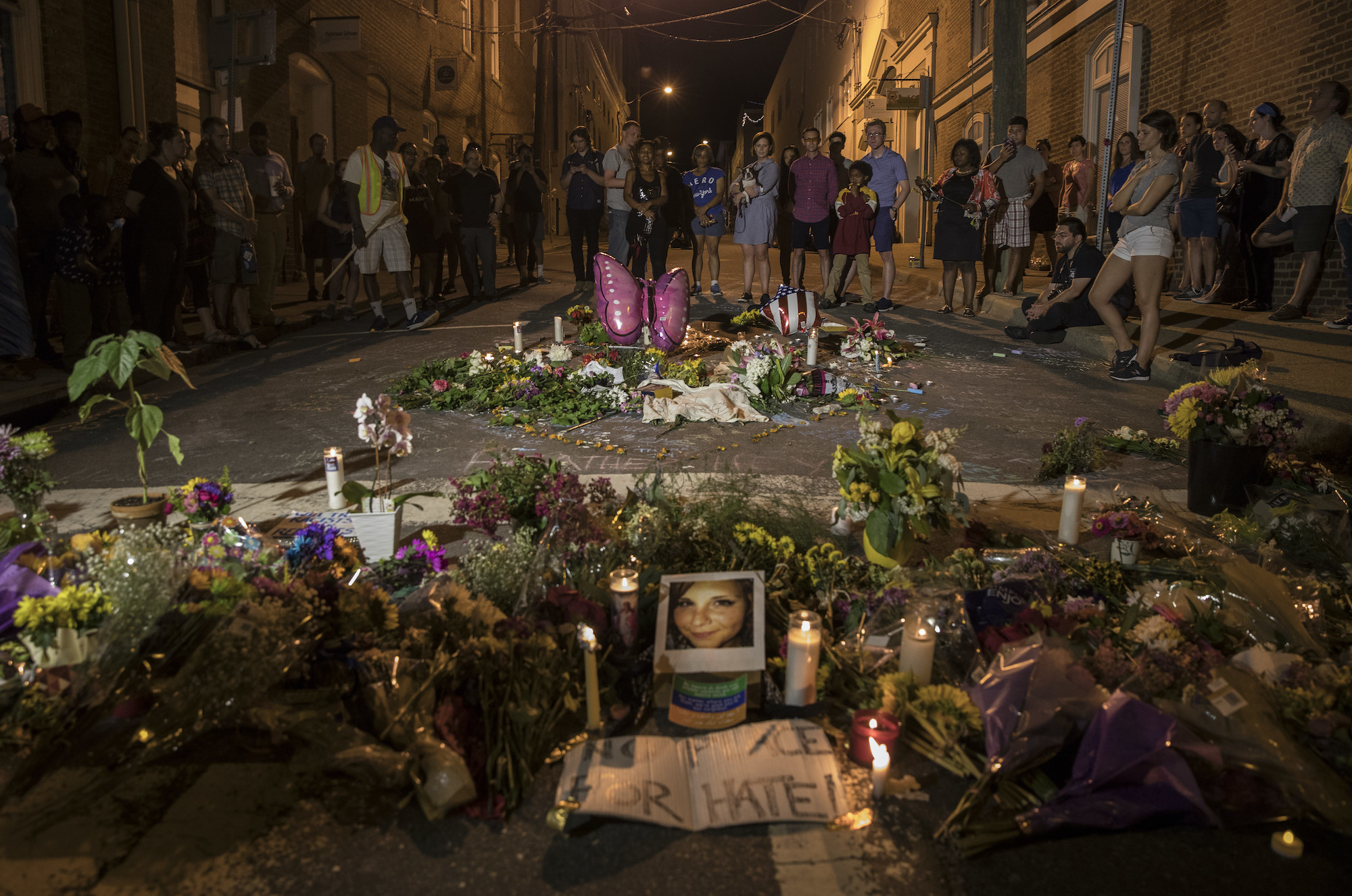
Before the trial began, the court handed down default judgments against seven of the defendants who refused to participate in the lawsuit and trial. The court will decide the damages they must pay to the plaintiffs at a later date.
But until Tuesday’s verdict, no other organizer or participant besides Fields had been held accountable for the violence that weekend by a jury of their peers.
The plaintiffs presented a mountain of digital evidence, including secret chat logs and social media posts, aiming to show the defendants had planned the violence at the rally in advance in hopes of stoking a “race war” and “celebrated” their brutality afterward.
The defendants struggled to rebut the claims against them, arguing that while they are racists and harbor views that most people find abhorrent, the violence occurred as a result of them fighting off attacks from left-wing “antifa” and “commie” counterprotesters. The defendants also tried to distance themselves from one another, in some cases claiming they had only met during the rally.
Spitalnick of IFA said she hopes the decision will bankrupt and dismantle violent hate groups and deter and prevent neo-Nazis and others like them from planning and committing racially motivated violence in the future.
To some extent, the trial itself already did that; Richard Spencer, the former alt-right leader, has said the lawsuit had been “financially crippling.” (He said in a tweet Tuesday that he'll appeal.) Many of his codefendants have also faced legal trouble, been kicked off of mainstream social media platforms, and been banned from raising money on crowdfunding websites in the four years since the lawsuit was filed.
Spitalnick told BuzzFeed News that the plaintiffs were pleased with the verdict. In a statement, April Muñiz, Chelsea Alvarado, Devin Willis, Elizabeth Sines, Marcus Martin, Marissa Blair, Natalie Romero, Reverend Seth Wispelwey, and Thomas Baker said it had been a long four years since they first brought their case.
"Today, we can celebrate the jury’s verdict finally holding defendants like [Jason Kessler, Richard Spencer and Christopher Cantwell] accountable for what they did to us and to everyone else in the Charlottesville community who stood up against hate in August 2017," the plaintiffs said. "Our single greatest hope is that today’s verdict will encourage others to feel safer raising our collective voices in the future to speak up for human dignity and against white supremacy.”
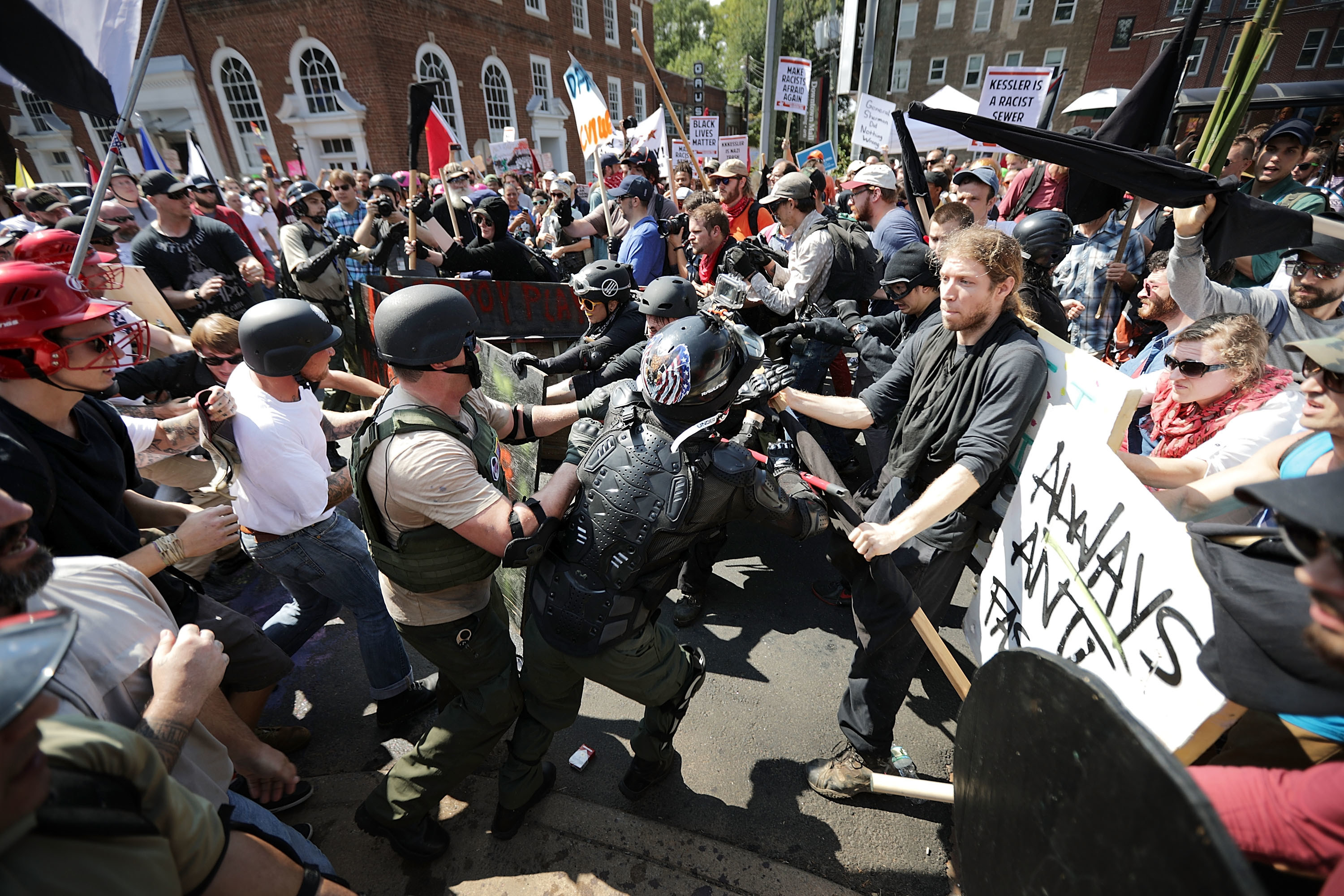
On the witness stand, they recounted what for them was the worst day of their lives.
As a photo of blood streaming down her battered face was shown in the courtroom and memories came flooding back, Romero choked up and her voice cracked. Through tears, she described the moments before the image was taken, when a Dodge Challenger driven by Fields rammed into a crowd of anti-racist demonstrators, killing Heyer and injuring dozens of other people.
“I get hit and the next thing I know is just darkness and hearing a long beep and thumps,” Romero, 24, testified.
She described it like a scene from a war movie when a soldier is blown up by an explosion and the screen flashes before going dark.
“I couldn't see too much, but I just felt [blood] dripping and it's warm on my face,” she said. “I thought I was about to die.”
Blair described in heart-wrenching testimony how her then-fiancé Martin pushed her out of the way of Fields' car. Martin, however, wasn’t so lucky. The car struck him, shattering his leg and sending him flying into the air.
“I was confused. I was scared. I was worried about all the people that were there,” Blair told the court. “It was a complete terror scene. It was blood everywhere. I was terrified.”
The days, weeks, and months after “Unite the Right” was also difficult for the plaintiffs, they said.
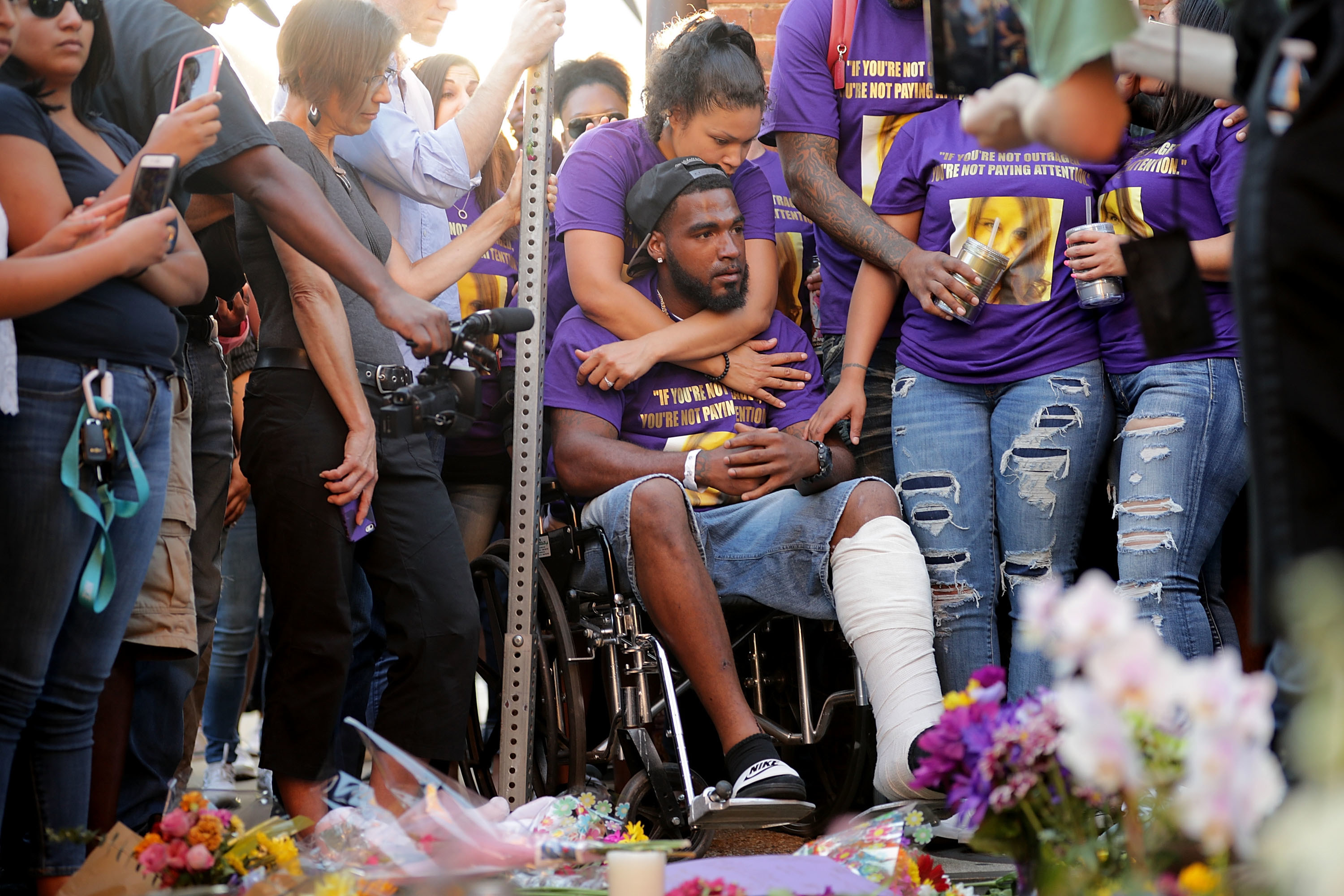
Blair and Romero, among others, discussed the personal and psychological effects they had suffered. Romero said she has had recurring nightmares. Blair, who married Martin months after the car attack, said her marriage ultimately failed because of the stress it had created between the two of them.
Their attorneys spent hours drilling their aggressors on the witness stand and using their own words against them. In one particularly damning direct examination of defendant and primary “Unite the Right” planner Jason Kessler, the plaintiffs’ counsel read from a May 2017 post he wrote on Discord.
“I think we need to have a battle of Berkeley situation in Charlottesville and fight this shit out,” Kessler wrote. “Can you guys conceal carry? I don’t want to scare antifa off from throwing the first punch. Big scary guns...will keep Antifa away. I want them to start something. Lots of armed military vets in attendance so we aren’t going to be lacking for firepower.”
Kessler and his codefendants made the case that while they are vile racists their words and actions did not amount to a violent conspiracy. But they lacked a cohesive strategy and more often than not their arguments were incoherent and hard to follow.
However, cognizant of the fact that audio of the trial was available to the public in real time and that it would be memorialized through court transcripts for anyone to read in the future, they seized the moment to spread their racist and hate-filled agendas and air personal grievances.
Neo-Nazi Christopher Cantwell, currently serving a prison sentence for threatening the wife of another neo-Nazi in an unrelated case, used racist slurs in both his opening statement and closing arguments and promoted his podcast on several occasions. While questioning witnesses, he spent much of his time trying to paint the plaintiffs as members of “antifa” and spreading propaganda and unfounded conspiracy theories about “commies.”
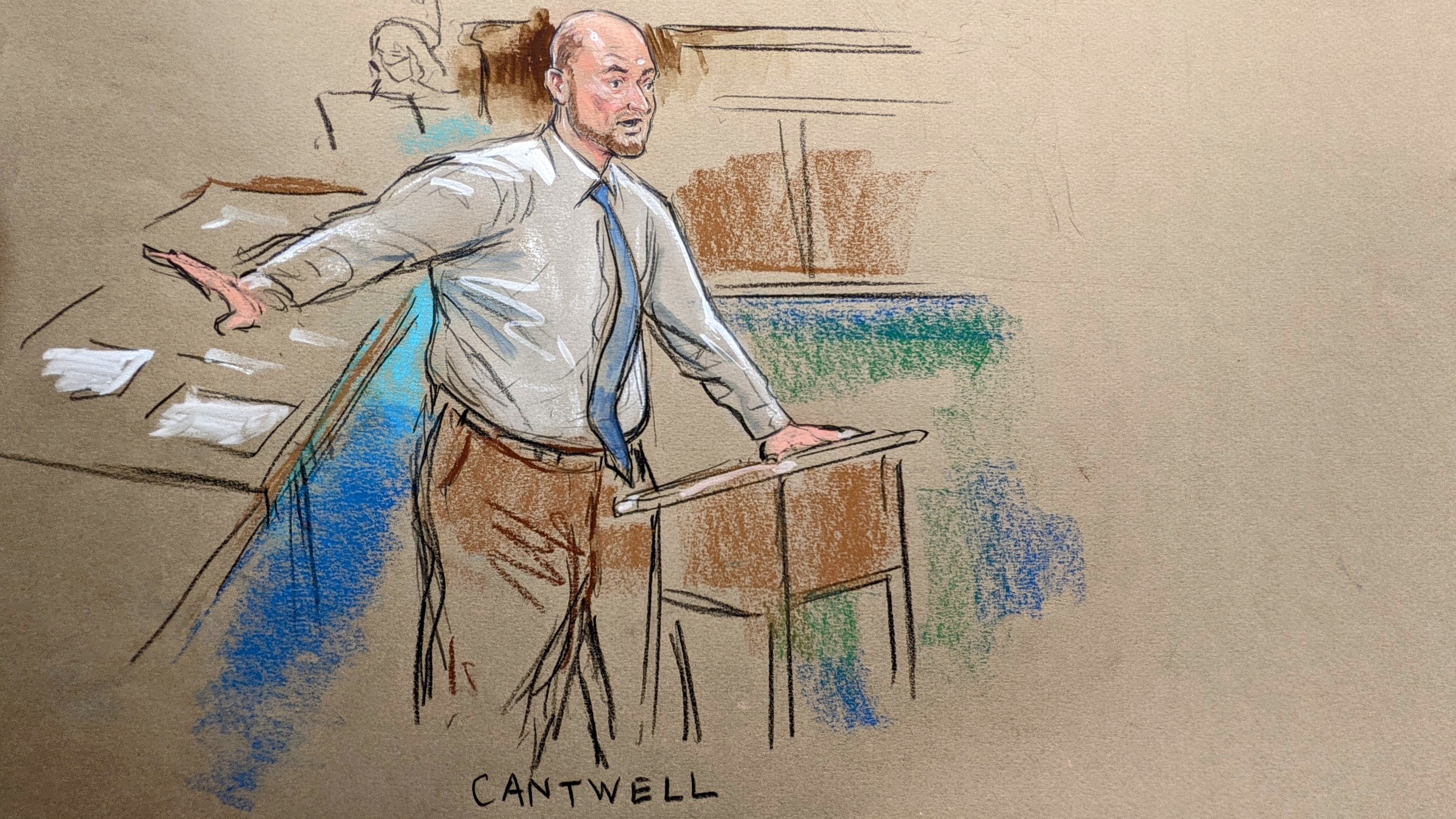
Spencer spoke at length about his desire to see an all-white “ethno-state” created and read snippets from a racist manifesto he had written. And in his closing argument, he compared himself to Jesus, “a radical, an extremist,” and a “scapegoat,” prompting Moon to cut him off. “You can’t cut me off for using poetry!” Spencer snapped back.
That those two defendants also served as their own counsel made for surreal and often perplexing moments. During one cross-examination, Cantwell and defendant and neo-Nazi Matthew Heimbach discussed their adoration for Adolf Hitler and denied there was a Holocaust.
“What’s your favorite Holocaust joke?” Cantwell asked Heimbach.
“My favorite?” Heimbach replied, chuckling before the judge cut them off.
In another, Spencer used his cross-examination of Kessler to criticize him and try to put distance between the two of them.
“When did you determine I was a sociopathic narcissist?” Spencer asked. Kessler lashed out at him, saying, “you were just despicable to everyone you came into contact with" and describing Spencer as having the demeanor of a “serial killer.”
The court also heard testimony from experts who spoke about how the defendants had couched their racism and violent intentions in jokes and memes. Deborah Lipstadt, a historian and an expert on the Holocaust, gave the jury a crash course on the matter.
Near the end of the trial, Cantwell and Spencer made a motion for Moon to dismiss the case, arguing that the plaintiffs had not presented any evidence to prove they were part of a conspiracy to commit racially motivated violence at “Unite the Right.”
Moon quickly dismissed their motions.
“You have a misunderstanding, I’m afraid, of what conspiracy is,” Moon said. He read back to them several messages exchanged during the planning of the rally that he said could show a conspiracy under federal law.
Speaking to reporters on Tuesday, Karen Dunn, co-lead attorney for the plaintiffs, said not getting a verdict on the federal conspiracy counts was no less of a victory.
“Our goal was to come here and to prove a conspiracy to do racially motivated violence as to each and every defendant and to get damages awards, compensatory and punitive, and we did all those things,” she said.

